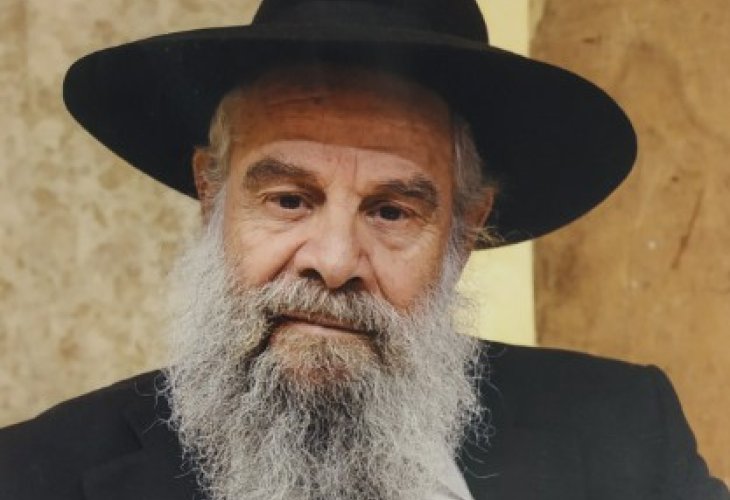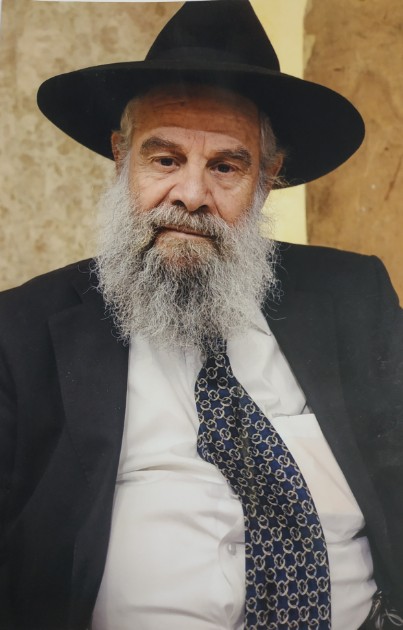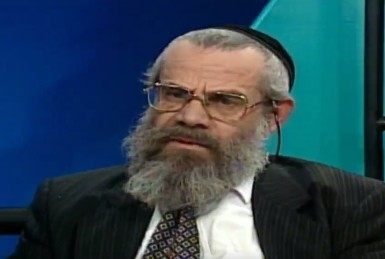Son of Rabbi Mordechai Arnon: "Dad Reached the Heights of Bohemian Culture, Then Realized the Truth"
From the Tel Aviv bohemian scene, Rabbi Mordechai Arnon joined Rabbi Uri Zohar and Ika Israeli, planting the seeds for outreach movements. What did he truly experience during those years? What did the transformation look like? And what stories linger? Rabbi Yehuda Arnon, Rabbi Mordechai's son, shares in a heartfelt conversation.
 Rabbi Mordechai Arnon, of blessed memory
Rabbi Mordechai Arnon, of blessed memory"Dad reached the pinnacle of the Tel Aviv bohemian scene," says Rabbi Yehuda Arnon, about two weeks after his father passed away—Rabbi Mordechai Arnon, known in the old Israeli public as 'Popik Arnon'. Rabbi Yehuda emphasizes: "The higher Dad climbed, the more emptiness he felt, and a greater desire to find true fulfillment in life."
I talk to him, feeling the great difficulty he experiences and the immense void his father left. "Dad was born a complete secularist, he didn’t know what religious people were," Rabbi Yehuda tells me. "The only acquaintance he had with religion was through his grandmother, who kept some tradition, but look where he ended up. It’s unbelievable."
Not "Bang and It's Over"
What made your father so famous?
"After Dad was discharged from the army, he acted in many movies at the Haifa theater, including the well-known films 'Maybe Ride Down There', 'Sallah Shabati', and 'Two Kuni Lemel'. At the same time, he performed in theater and children's shows like 'The Adventures of Popeye', where he played Popeye the Sailor. Later, he was one of the founders of 'The Twins Trio', releasing albums that became hits. All this made him a figure in the Tel Aviv bohemian scene. But what really made him famous was the film 'El Dorado'; overnight, the entire country knew him. It opened the world of acting to him several levels above everyone."

How did your father decide to return to religion from such a high place?
"It wasn’t 'bang and it’s over', it was a long and ongoing process. Dad explained to me more than once that it all started with butterflies in his stomach, then developed into thoughts, and from there to actions leading to a real and open return to religion. The first butterfly began after the Yom Kippur War, when during the war, serving in the Nahal band, he joined Miki Caspi, Oshik Levi, and Ilana Rovina, and the quartet performed in front of soldiers as 'Rovina, Popik, Caspi, and Oshik'. Their most famous song was 'We Have No Words', a hit at the time. They toured outposts at the front, singing and encouraging the soldiers and commanders, and there he suddenly discovered the emptiness and lies in Israeli public life. From then on, he began to contemplate the path he was on."
And when did the second butterfly occur?
"He had a good friend who lived with him in Tel Aviv. His name was Aryeh Yitzhak, of blessed memory. He was a senior member of the 'Black Panthers' and one day decided to return to religion. That was Dad’s second boom. To Aryeh Yitzhak’s credit, he's the one who convinced Dad to come to the 'Ohr Somayach' yeshiva in Jerusalem. When they got to the yeshiva, it was intended only for American boys, not for Israelis, because forty-five years ago, the concept of returning to religion didn’t exist here. People didn’t even know what it was, and they were pioneers who opened the Israeli department for returnees at Ohr Somayach and in Israel in general. There were only five boys who initiated the beginning of the religious return revolution in the Land of Israel."
And when did the well-known connection between your father and Rabbi Uri Zohar develop?
"It was an interesting story. Rabbi Uri Zohar returned to religion three years after Dad, and it was purely by chance. Dad and Rabbi Zohar were very good friends; they also acted together in various films and during different occasions. Then, three years after Dad returned to religion, he got married. It was clear that Uri Zohar would attend the wedding, but something happened to Uri on the way, and he didn’t make it, which later turned out to be a blessing. Due to the discomfort created from not attending, he felt the need to visit Dad and give him a big gift in honor of the wedding, and to catch Dad, he had to go to the 'Ohr Somayach' yeshiva. When Uri got there, he 'peaked and was affected', drawn to the charm of Judaism, and that’s how his path to religion began. At the funeral, he eulogized Dad, and told him: 'Know that I am here thanks to you.' Their bond strengthened, and they began working on outreach. At the time, there was a wave of religious returns among celebrities from the entertainment and arts field of the 70s, who also joined the outreach initiative. Among them were Alona Einstein, Ika Israeli, and Nissim Menachem."
Did the relationship with Rabbi Uri Zohar continue even after returning to religion?
"Yes, absolutely. They worked together in outreach to those far from religion through various platforms, with different organizations. Each one was in a different organization, but they cooperated and coordinated fully. They began the wave throughout the country - home circles, classes in prisons, seminars in America, and where not? Dad once told me that he considered creating an entertainment program with Rabbi Uri Zohar, mocking the idolatry of the secular generation. In the end, he realized that the secular audience wouldn’t understand what he was laughing about. But he didn’t give up on laughter and his sense of humor. For example, in the framework of his involvement in marital harmony, he used to tell that once a housekeeper came to a house in northern Tel Aviv. She asked the house owner, 'Where’s the rag?', and she replied, 'He already left for work at seven.' That's how he opened the hearts by injecting humor."
A Second Generation Thanks to Dad
One of Rabbi Arnon’s well-known and notable friends was the painter and spiritual figure Ika Israeli. Arnon and Israeli walked together on all the paths, paving the way for the new generation of returnees to religion.
Tell me about your father’s relationship with Ika.
"Ika was a very important figure in Tel Aviv. Before his return to religion, he was considered an A-league artist, and at some point, he discovered Judaism. This happened a few years before Dad returned to religion, and then when Dad made the turn in his life, their connection was so natural and beneficial. Ika and Dad were partners along the way for thirty years. It started from Ika’s apartment in Tel Aviv, which served as a 'Chavruta' study house, where they had conversations with young people who came to learn and listen. Many of them moved to Jerusalem, and continued studying Torah and observing the commandments. During that time, Ika received the nickname 'Admor of Dizengoff'. Afterwards, they continued at the Ohr Somayach yeshiva, and later he joined the new Israeli college MILY (Madrashah for Israeli Jewish Studies) with Dad. Later on, they founded together the "Beit Hillel Yeshiva", within which they held lectures, seminars, and classes, and the "Torah Arts" association for promoting religious art. He also had a family connection with Rabbi Uri Zohar, when in 1979 Ika married Snunit, who was the widow of Air Force Lt. Col. Shuki Livnat, and the sister of Rabbi Zohar’s wife. But the big story and the divine assistance connected to Ika was immediately following the passing. Ika passed away ten years ago, and Dad, who was very connected to him, would go up to visit him in the cemetery. Once when I accompanied Dad, he said to me: 'I need to buy a burial plot next to him, he’s the man I want to be buried next to.' He asked a rabbi, and somehow the matter faded and was forgotten. Dad passed away on Friday at eleven-thirty, and we had to arrange a burial plot. I called the society in Mount of Olives, and they told me - 'There is no such thing, whoever didn’t buy a grave, has no chance of getting a plot where he wants, certainly not on Friday.' But we didn’t give up. We exerted pressure here and there, and by some miracle, Dad won a grave next to his friend and partner, Ika Israeli. Two people who experienced the same path, the same challenges for the sake of the Creator of the Universe, were buried side by side."
You mentioned they opened the 'Beit Hillel Yeshiva'. Was it supposed to oppose the disreputable 'Hillel' organization operating in the opposite direction?
"Apparently so. The idea was that anyone searching for 'Hillel' would reach the Beit Hillel Yeshiva. Dad told me about various boys searching for themselves. There was a very good boy from a very famous yeshiva in Jerusalem who fell into a long and ongoing crisis. He decided he was done, leaving the religion. He called directory assistance and asked for the phone number of Hillel. They gave him the phone number of the Beit Hillel Yeshiva, Dad answered the phone, and on the other end of the receiver, the broken boy poured out his heart. Dad told him: 'No problem, the matter is under control.' He contacted his head of yeshiva, asking to put more emphasis on the mentioned boy, more attention, more warmth, and love, to bring him close. Dad followed the story, and the boy, who wanted to leave Judaism, is today a great yeshiva head. Do you understand how it worked?"
In addition to the outreach activities, Rabbi Mordechai Arnon dealt with other areas he believed could improve the world and make it better. "Thirty years ago, we had a new little brother in the family - Shalom the cutie. He was born with Down syndrome," Rabbi Yehuda tells me. "At that time, Down syndrome, or anyone with special education needs, received special treatment, but in the negative sense of the word. There was no awareness of the matter. But Dad did not agree to accept it, he said it was not a challenge, but a mission. Therefore he started to assist in establishing the unique settlement 'Gevaot', located in Gush Etzion. The idea of the settlement is that the families living there are all connected to the 'Integration Workshop' association, which runs a housing and employment project for adults with special needs living there and integrated fully into community life. 'Integration Workshop' was established as an educational initiative, aimed to integrate children with special needs into the community. Over the years, a group of families who saw integration as a way of life formed around the workshop, aspiring to establish an integrated community, centered around a school and apartments designed for those with special needs. After several years of activities and living in temporary sites, the area in Gevaot was identified, and with the help of local authorities, the families settled in the community. Today about forty families live in the settlement. My brother Shalom is an active member of the community there, and it's thanks to Dad, who raised awareness among the authorities about the plight of those with special needs, pushed, assisted, and provided backing in establishing the settlement."
Sounds like your father dealt in numerous fields. What left the most significant mark on you?
Rabbi Yehuda ponders briefly before replying: "Dad delivered a regular lecture in Rishon Lezion, where a dear Jew, a captive baby, would come to enjoy the lessons. He would come without a yarmulke. One day he told Dad he wasn’t coming anymore due to a connection he developed with someone from Netanya. Dad did not want to miss that holy Jew, so he didn’t give up, and sent a friend from Netanya to learn with him regularly. The reason this story moves me is because during the shiva mourning period, a young Jew came to console me, saying he was a student of some rabbi from Netanya who sent him to console. When I asked him who was this rabbi from Netanya, I realized it was the Jew who stopped coming to the lessons, and thanks to Dad’s persistence to advance him, he returned to religion, and now he helps others return too. It amazed me - a second generation of returnee, thanks to Dad's dedication and determination."

For Health
In his later years, Rabbi Arnon published a weekly personal column in the Haredi magazine 'Family', where he advocated for proper nutrition and a healthy lifestyle. In his columns, he frequently criticized conventional medicine and recommended adopting methods from alternative medicine. "He called it a second return to religion. The first spiritual return to religion, and the second - a medical return to religion," explains his son.
When did he begin with this, and why?
"Dad started dealing in the field in the last ten years, following illnesses he was dealing with. He realized something was amiss in the conventional medical system, which primarily deals with treatment and not prevention. Therefore he began to take an interest in natural medicine. In his regular column in 'Family', he laid out his broad approach. Many came to consult with him, and his home was open to anyone asking for help, and it was all free of charge; it was a mission for him."
Forgive me for asking, but how is it that all his health care did not ultimately benefit him?
"You’re asking a great question, which also should and must be asked. Dad told me about it because after forty years of smoking cigarettes and processed foods he ate from infancy, it was probably too late to fix everything, especially at age 67, when the body was already poisoned. So he called on young people who can still fix to catch themselves quickly and take care of their bodies before it's too late."
In conclusion, Rabbi Yehuda tells me: "It is written in the Midrash, 'One who passes away and is buried on Friday after the fourth hour, is spared from grave punishment, a sign that he is not deserving of any punishment.' Dad had so many merits, and it’s understandable why these words were said about him. May his memory be blessed."

